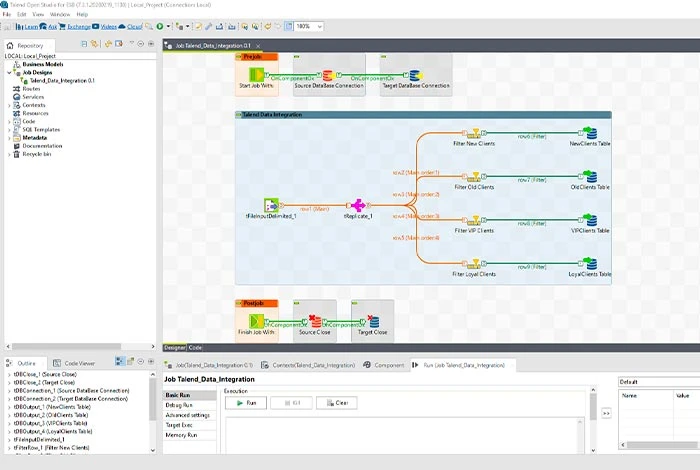
Open Source ETL tools efficiently extract data from one or more data sources, apply a sequence of transformations to the extracted data, and then load the transformed data into a data warehouse. Complex data transformations, such as data purification, deduplication, migration, enrichment, and aggregation, are performed using it. Choosing the type of ETL app, open source ETL tools are typically free, well-supported by developer communities, and frequently more scalable and customizable than proprietary ETL systems. However, with so many free ETL tools on the market, it is incredibly difficult to determine which one is best. Therefore, we have compiled the Best Free and Open Source ETL Tools for Data Management.
ETL Tools Types
Various types of ETL solutions have entered the market in recent years due to the evolution of technology. Here are the top three types.
- Commercial ETL Tools – This ETL solution is ideal for large organizations with complex workflows and large data volumes. Commercial ETL tool solutions may be on-premises or accessible via the cloud.
Example: IBM DataStage, Oracle Data Integrator.
- Open Source ETL Tools – Many companies favor open source tools because they provide potent features at a low cost (or even for free). In addition, users of open source software are permitted to modify the tool code, omit sections of the code, and more. In addition, they feature a simple and accurate user interface and allow users to add new features.
Examples: Hevo Data, KETL.
- DIY ETL Scripts – Unlike tool-based approaches, which certain features may limit, DIY ETL Scripts entail hand-coding with complete flexibility. ETL scripts can be developed in various programming languages like SQL and Python. This hand-coded system can also be customized to manage any data set for your business directly.
Example: Pygrametl, Airflow.
How To Find The Best Open Source ETL Tool?
When choosing an open source ETL tool, several factors must be considered. The most important factors are the extent, complexity, transformation requirements, update frequency, source database, and target database of your data. Select the ETL tool that meets your requirements and needs the best. If you have a modest quantity of data that is not excessively complex, you can use a standard ETL tool. If you have a large quantity of data or your data is extremely complex, you’ll need to customize the open source ETL app with modules, integrations, and custom code.
Open Source ETL Tools Limitations
Although ETL tools can be a valuable component of your Extract, Transform, and Load (ETL) pipeline, they have a few drawbacks, particularly regarding support. There are several limitations associated with open source ETL tools.
- Several companies need to connect some of their apps.
- Due to a shortage of robust management, ETL tools are unable to readily handle errors.
- When data is aggregated from various RDBMS (Relational Database Management Systems), non-RDBMS connectivity of ETL tools can contribute to poor performance of the data pipeline.
- Some ETL tools must analyze massive quantities of data, but app processing can only occur in tiny batches. This can reduce the data pipeline’s efficacy.
Since open source ETL tools frequently need more expert support, companies with complex transformation needs cannot use them.
Best Free & Open Source ETL Tools
Here are a few of the best ETL and data integration tools, along with a description of their pricing and features.
1. CloverDX

The CloverDX ETL software enables developers to connect to any data source and manage numerous data formats and transformations. In addition, with CloverDX, developers can write, receive, consolidate, join, and validate data using a vast array of configurable components. Additionally, you can easily construct and debug data pipelines using an integrated development environment.
2. Talend Open Studio

With Talend Open Studio’s graphical environment, you can simply and rapidly transform complex data. It also features drag-and-drop capabilities for expedited data transformation.
3. Apache Nifi

Apache NiFi is an efficient, robust, and scalable open source ETL app for routing and transforming data flow. In addition to high-level data transformation features, it supports system mediation logic & scalable data routing graphs, making it a dependable ETL tool. Additional options to customize your data flow include determining high throughput or low latency, ensuring delivery, or tolerating loss.
4. Singer
Singer Tap is a non-proprietary ETL software enabling data migration from MySQL, Salesforce, and Postgres to data warehouses such as Redshift, BigQuery, and Snowflake. In addition, Singer Tap is exceedingly lightweight and user-friendly. You can also schedule data transformations, and Singer will manage the duties automatically.
5. Apache Camel
Apache Camel is a well-known and feature-rich framework for enterprise data integration that integrates various data consumption and generation systems. In addition, Apache Camel offers a Java object-based implementation of the Enterprise Integration Patterns (EIPs) to transform and route data with Java beans via the routing engine. Camel can be used as a standalone or embedded within other J2EE apps.
6. Pentaho Data Integration
PDI is part of the Hitachi Vantara DataOps suite. In addition, with PDI, you can extract, transform, and manipulate data by designing and deploying end-to-end data pipelines at the enterprise level. It enables data distribution regardless of whether it resides in a lake, warehouse, or device and seamlessly integrates all data.
7. Airbyte
Airbyte is an open source ELT tool that synchronizes data between APIs, databases, and apps with warehouses. Using Airbyte’s modular architecture and open source nature, data engineering teams can manage everything from a single platform.
8. Apatar
Apatar is a comprehensive data integration solution that enables individuals to connect to any data source, transform data, and automate data migration. In addition, it provides a transformational component that converts data into the required format and a scheduler to automate the data synchronization process.
9. KETL
KETL is a GPL-licensed ETL platform that facilitates the extraction, development & deployment of data consolidation and transformation procedures. Using KETL’s scheduling manager, users can schedule ETL tasks based on time or data events. In addition to supporting proprietary database APIs, KETL supports relational and independent file data sources.
10. Apache Kafka
Well, Apache Kafka is an open, real-time ETL platform that companies around the globe use for efficient data pipelines, streaming analytics, and data integration. In addition, this event streaming platform facilitates the processing of multiple event streams with aggregation, joins, transformations, and other one-time processing capabilities.
11. Logstash
Logstash is a free and open source data processing infrastructure that extracts and combines data from multiple sources in real-time and makes it simple to use in preferred destinations. Additionally, it is a product of Elastic and a part of Elasticsearch. This ETL tool collects data from logs. In addition, it can extract all types of data logs (web and app) and capture log formats and networks from cloud-based and on-premises data sources. Logstash was created to aggregate data from logs, but its functionality extends far beyond that. It can transform data effectively with filters, native codecs, and output modules. Logstash may be difficult to use if you are not a programmer or possess no technical knowledge. Additionally, this tool must be installed, verified, executed, and maintained in a development-based environment.
12. Hevo Data
Hevo Data is a no-code data conduit that enables you to replicate data in real-time to the destination of your choice, such as Firebolt or Redshift. Also, the platform is extremely user-friendly and requires no technical resources. It also integrates with over 100 databases, CRMs, SaaS apps, and Salesforce software. With Hevo Data’s reverse ETL solution, companies can transfer data from their data repositories to any sales, marketing, or business apps. To match your target app, the tool also converts app data types from various sources to a source of your choice.
FAQs:
What Are ETL Tools?
Well, ETL is an acronym that stands for Extract, Transform, and Load. ETL tools extract data from multiple data sources, transform it into the necessary format, and load it into the database.
What Are The Key Features Of Open Source ETL Tools?
The main features of Open Source ETL Tools include their GPL availability, support for multiple data formats, and extensive customization options. Apache Camel, Airbyte, and CloverDX are some of the most prominent Open Source ETL apps.
What Are The Benefits Of Open Source ETL Tools?
Provide multiple benefits, including ease of use, customization, scalability, and developer community support.
What Are The Limitations Of Open Source ETL Tools?
The greatest drawback of free Open Source ETL Tools is the vendor’s need for more technical support. In the event of a problem, users must rely on the developer community for resolution.
What’s The Best Open Source ETL Tool?
The specific needs of the users determine the best open source ETL tool. Talend Open Studio, Apache Camel, and Singer are among the most prominent tools.
What Factors Should You Consider While Selecting ETL Tools?
When selecting an ETL tool, you should consider its features, ease of use, cost, scalability, and support, among other factors.
What’s The Difference Between ETL And ELT Tools?
ELT tools are typically used to compile semi-structured and unstructured data, whereas ETL tools compile relational, structured, and smaller datasets. In addition, ETL tools transform data before importing it into the data warehouse, whereas ELT tools load data into the data warehouse before transformation.
Also, Check:



